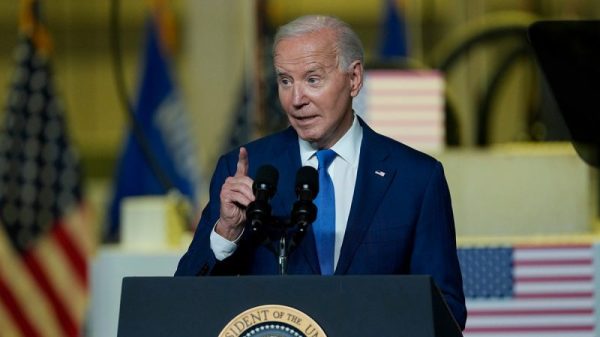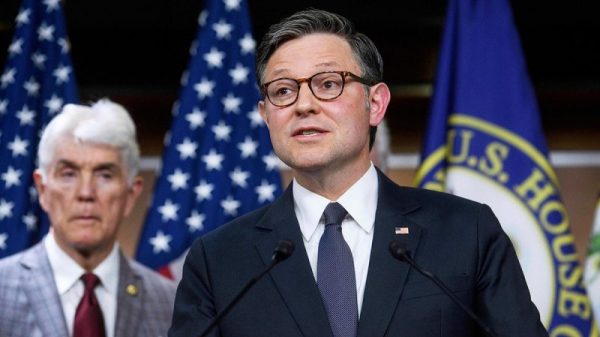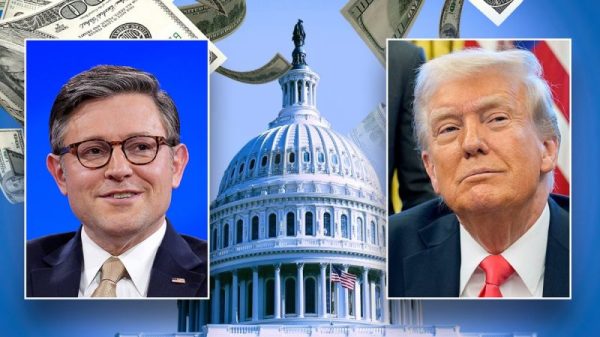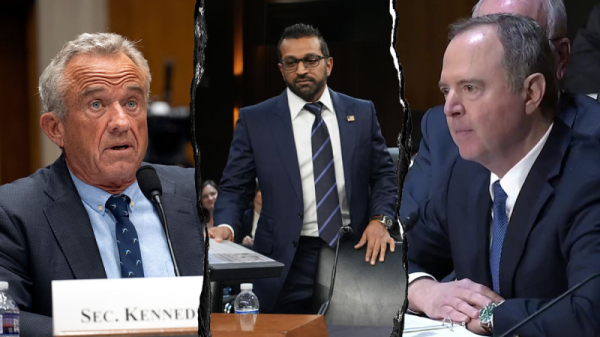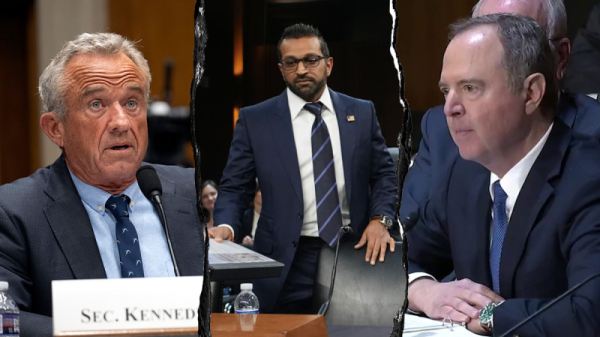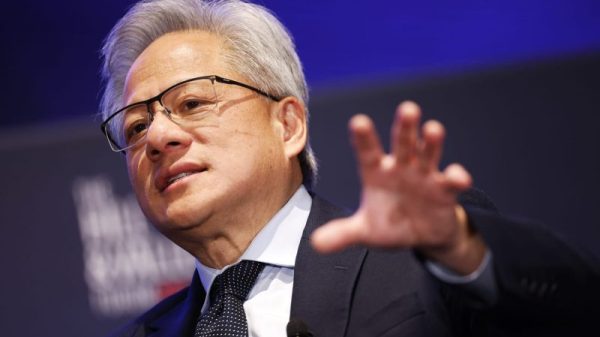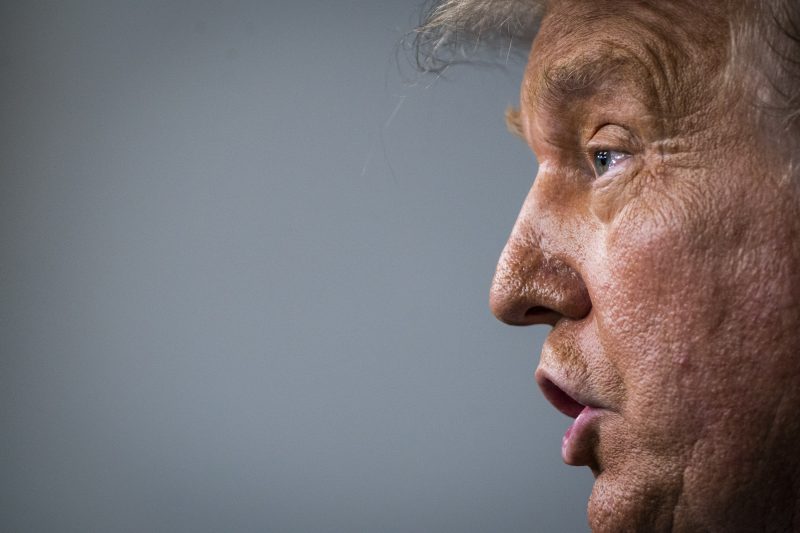One of those little pivot points of history unfolded in mid-February 2020.
Representatives of the intelligence community traveled to Capitol Hill on Feb. 13 to brief lawmakers on threats to the country, including Russia’s renewed interest in influencing the outcome of presidential elections. As it had in 2016, Russia hoped to help Trump win that November, the officials said — yielding angry pushback from Republicans. The next day, President Donald Trump excoriated his acting director of national intelligence, Joseph Maguire, and Maguire was fired within a week.
On Feb. 14, Trump participated in his own election-related meeting. Officials from a number of agencies, including Maguire’s, informed the president that they had no concerns about the integrity of the upcoming election. Trump had by that point spent more than three years pushing back against the idea that his 2016 election was in any way a function of Russian involvement, which may have prompted him to float the idea of holding a news conference touting the security of the upcoming contest.
He ended up not doing so. And while Trump was never beholden to the idea that his rhetoric should be consistent over time, not holding that news conference made it easier for him to pivot to an argument aimed in precisely the opposite direction: The election was inherently suspect.
The Feb. 14 meeting has received new attention this week with a report from CNN that special counsel Jack Smith had asked witnesses about the discussion.
“Investigators seemed particularly interested in understanding Trump’s mind-set about election security before he embarked on a months-long campaign to cast doubt on elections,” a source told CNN’s reporting team.
This question is a subset of a larger issue: How often was Trump told that his myriad claims about election fraud were false? To what extent should he have known — and did he know — that his assertions were untrue? Establishing that Trump was cognizant of his misinformation isn’t necessarily a requirement for Smith to obtain a conviction against Trump for possible election-related crimes. But there is nonetheless a lot of evidence that Trump knew his claims were false and a mountain of evidence that he should have known.
It was about a month-and-a-half after that Feb. 14 meeting that Trump began eagerly promoting the idea that the election would be riddled with fraud. The trigger for it was the emergence of the coronavirus pandemic. That spurred legislators on Capitol Hill to push for increased funding allowing states to improve vote-by-mail systems, something that Trump seized upon, without evidence, as a vehicle for fraud.
On March 30, he called into Fox News to allege that Democrats were simply trying to tilt the playing field in their direction by making it easier to vote. About a week later, he tweeted a more explicit argument: The left was trying to facilitate fraud.
Republicans should fight very hard when it comes to state wide mail-in voting. Democrats are clamoring for it. Tremendous potential for voter fraud, and for whatever reason, doesn’t work out well for Republicans. @foxandfriends
— Donald J. Trump (@realDonaldTrump) April 8, 2020
Trump’s assertions about fraud in elections were long-standing, of course, predating even his 2016 election. Even then, the rationale was obvious: Claiming omnipresent fraud was an effective way to excuse any electoral loss. When he came in second in the Iowa caucuses in 2016, the first time he’d been on the ballot, he quickly alleged that Sen. Ted Cruz (R-Tex.) had engaged in fraudulent activity as an excuse for his failure to win. It was a pattern.
But his emphasis on mail ballots as a conduit for alleged fraudulent activity became a mantra from him and his team at the White House. Those efforts quickly triggered an immune response, with fact-checkers and other authorities noting that his assertions were false or overstated. Trump and his allies pointed to an old report co-written by Jimmy Carter as evidence of risk, so Carter offered an unusual public response defending expanded ballot access. Each claim made by Trump yielded an explanation of why it was misleading — an explanation that was certainly available to Trump should he wish to pay attention to it.
By summer, the flurry of claims had become so constant and so egregious that it was beginning to evoke exhaustion from those who understood both that the claims were false and what Trump was hoping to do. The president wanted his base to think that mail-in ballots were suspect so that they would be dismissed as illegitimate in the event that the election was close. Which, of course, is what happened.
The election was held on Nov. 3 and called for Joe Biden on Nov. 7. That same day, the Associated Press published an early debunking of a common claim about fraud, explaining that miscounted ballots in Antrim County, Mich., were a function of a misconfigured ballot-counting machine. Yet this idea — that Antrim County was a harbinger of a massive effort to throw the election — lingered for months, including in Trump’s rhetoric. He mentioned it in his speech on Jan. 6, 2021.
A few days after the election was called, Reuters debunked the idea that there had been suspicious dumps of ballots that swung the election, another bit of invented scandal that far outlasted the point at which it was debunked.
You are likely to recall that the post-election period (like the pre-election period) was a hailstorm of false claims that were quickly and universally revealed as inaccurate. The Washington Post’s fact-checking team published debunk after debunk after debunk. For Trump, as for everyone else, there was no reason to think that the results were suspect.
Trump, though, had additional reasons not to think the election was tainted by fraud.
One can point to the various lawsuits filed by his campaign and his allies, suits that invariably failed to demonstrate that his election loss was a function of anything other than voters preferring Biden. Most of those lawsuits, though, centered on changes to election laws or other mechanical issues, almost certainly in part because his lawyers were unwilling to attest to claims about fraud that they knew were false.
This wariness was revealed in an email sent by Trump’s attorney John Eastman in late December. Trump’s campaign had filed a suit in Georgia that month that made several claims about purported fraud that were soon shown to be untrue. That suit was withdrawn before being refiled at the federal level.
In filing that new suit, the attorneys planned to incorporate the facts of the earlier suit by reference, essentially reasserting the debunked data. Eastman warned against this.
“Although the President signed a verification for [the original complaint] back on Dec. 1, he has since been made aware that some of the allegations (and evidence proffered by the experts) has been inaccurate,” he wrote. “For him to sign a new verification with that knowledge (and incorporation by reference) would not be accurate.”
In other words, Trump knew the numbers were false. He made similar claims in his Jan. 2, 2021, call attempting to get Georgia officials to overturn the results in their state. The state, of course, had already confirmed its results on Nov. 19 and Dec. 7.
Trump should also have known that his claims about fraud were false because people he was paying to consider the issue told him they were. The House select committee investigating the Capitol riot determined that Trump’s senior advisers were told on Nov. 12, 2020, that his loss was a function of politics, not fraud.
“This analysis by the data team examined the turnout and margins on a county-by-county basis in a dozen States while also analyzing demographic changes that impacted the results,” the committee’s final report states. “[The] team determined that President Trump lost each of those six States because Biden had performed better than President Trump in certain areas like population centers or suburbs.”
The committee spoke with other officials who reported telling Trump that his fraud claims were false. Jason Miller, then and now an adviser to Trump, reported telling the president multiple times that his claims were baseless.
The Washington Post reported that the day before Trump’s call to those officials in Georgia, his campaign received a report from a group to which it paid hundreds of thousands of dollars to assess fraud claims.
“Just like any election, there are always errors, omissions and irregularities,” one person familiar with the report’s contents told The Post. “It was nowhere close enough to what they wanted to prove, and it actually went in both directions.”
That was one of two such probes. Another, also reported by The Post, tasked a software engineer named Ken Block with assessing the possibility of fraud.
“No substantive voter fraud was uncovered in my investigations looking for it, nor was I able to confirm any of the outside claims of voter fraud that I was asked to look at,” Block told The Post. “Every fraud claim I was asked to investigate was false.”
Again, all of that sat alongside public repudiations of the idea of fraud. Trump was reportedly enraged when, on Dec. 1, Attorney General William P. Barr told the Associated Press that there was no evidence of rampant fraud.
“To date,” he said, “we have not seen fraud on a scale that could have effected a different outcome in the election.”
This true assertion precipitated Barr’s firing. A similar fate befell Chris Krebs, director of the Cybersecurity and Infrastructure Security Agency (CISA) and one of those involved in the Feb. 14 briefing. On Nov. 12, CISA published a statement that reiterated what Trump had been told nine months before.
“There is no evidence that any voting system deleted or lost votes, changed votes, or was in any way compromised,” it read.
Krebs was fired within a week. Instead of listening to what his allies and staffers had to say about fraud, Trump repeatedly chose instead to silence them.
One can see why this pattern might be of interest to Jack Smith.

